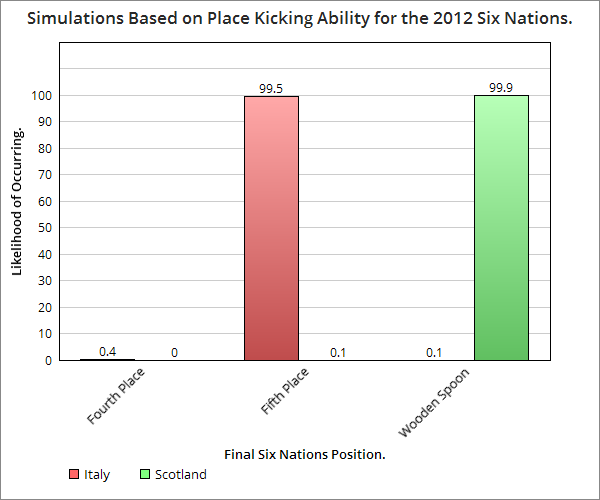In this previous post I looked at the effect of place kicking ability on the result of a single rugby union match based on rating kickers with a simple logistic regression model. The results highlighted the development of George Ford, England's current number 10, from his entry into the game with Leicester to his current position as an international kicker.
A more useful application of kicker ratings in rugby union is to compare the range of match outcomes over a competition, such as the Six Nations, bought about through the natural variation around a kicker's likely talent, as well as the effect of replacing that talent with an average value from the current pool of place kickers.
In this way we might usefully show the contribution made to a country's success by their regular kickers compared to that expected from an average replacement level of kicking ability.
The Grand Slam isn't a particularly rare event in the history of the Five and now Six Nations, it has been won in 40% of the tournaments since 1947 and was last won in 2012 by Wales.
With the exception of half a dozen kicks from Rhys Priestland, Leigh Halfpenny was the place kicker for each of Wales' five 2012 victories. England relied upon Owen Farrell, Scotland, Grieg Laidlaw and Ireland, Jonathan Sexton, while France mixed and matched between four different kickers and Italy used three different kickers.
I have used the kicking stats for each of the kickers from their previous season, both at club and international level. The majority of the Six Nations kickers had well in excess of 100 penalty or conversion attempts in that period and these kicks have been used to project how successful each kicker would expect to be when faced with the kicking opportunities during the Six Nations based on the difficulty of each kick.
I've then simulated the probabilistic outcome of all 153 kicks made during the competition and re scored all 15 matches by adding the outcome of simulated place kicks to those points scored from tries and open play kicks. Each "tournament" is replayed 10,000 times.
Wales won three of their five matches by a converted try or less, but even over 10,000 place kicking match simulations they remain the overwhelmingly most likely side to have taken the championship. Although the possibility that a single bout of unlucky place kicking could lead to a single defeat is clearly demonstrated by the likelihood of a Grand Slam falling to 73% compared to a 97% title chance.
Wales had by far the best points differential, which is used as a tie breaker if league points are equal and this advantage spills over into the simulations when they are tied with others on eight points.
There was a tiny possibility that England could have won the Grand Slam, although they were mostly competing with Ireland for second spot.
Ireland's comprehensive defeat by England effectively ended their chances of "winning" a virtual Slam, no amount of excellent Sexton place kicking could over turn the 10 points to 0 try scoring differential. But their heavy actual and potential defeat of Italy kept alive their chances of second spot in the simulations. This also indicates the large role played by the weaker sides in determining positions at the top of the final table under the current regulations.
Rhys Priestland began the tournament as Welsh place kicker and although statistically inferior to Halfpenny in the previous season he would expect to kick better than his poor, small sample efforts in 2012. Because of his poor start, Halfpenny remained Wales' primary place kicker during 2012.
In the plot above, I've simulated Wales' 2012 results firstly with Priestland and Halfpenny as the place kickers, each with the expected ability that they had demonstrated in 2011 for Wales and the Scarlets and the Blues respectively.
I've then re run the simulation using the modeled kicking ability of an average, regular kicker from the 2011 season to see the potential cost of playing with an average, rather than exceptional kicker, in the case of Halfpenny.
An average kicker costs Wales about two championships per 100 simulated trials, falling from around 97 with their actual choice of kickers to 95 with an average replacement. So Wales' 10 tries shared around each of their five games, bettered only by Ireland's 13 appears to make them worthy champions, almost regardless of kicking ability. However, Grand Slams, which are unforgiving of a single slip up, fall by six per hundred from 73 to 67 with a par kicker.
Probably just as importantly, England win one Slam per 100 when Halfpenny takes the majority of Welsh kicks, but the agony/ecstasy is doubled to two if a par kicker takes the field for the Welsh.



No comments:
Post a Comment